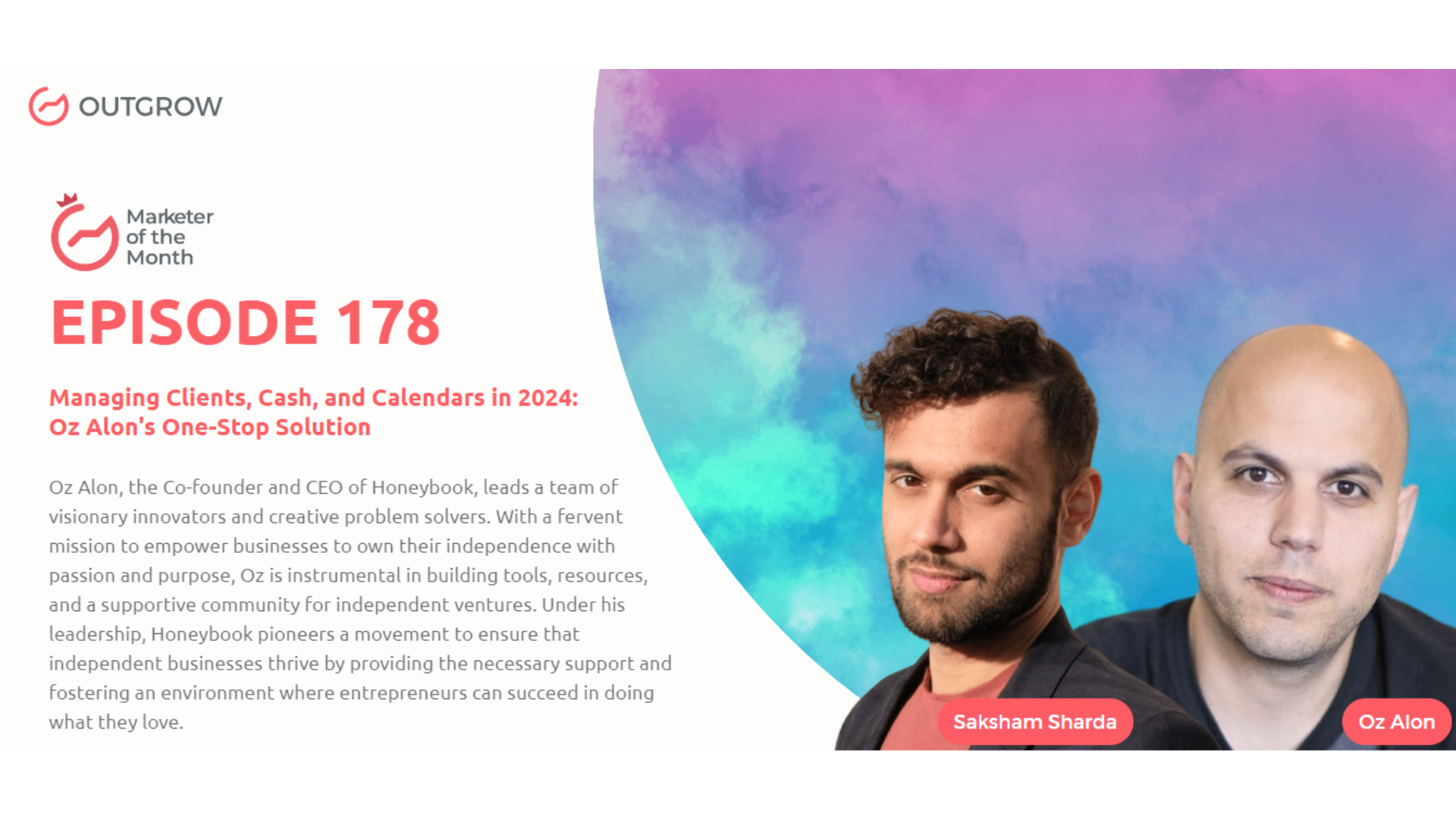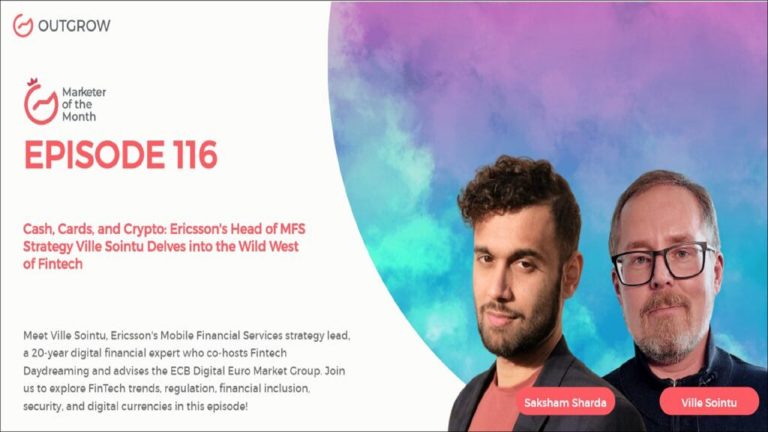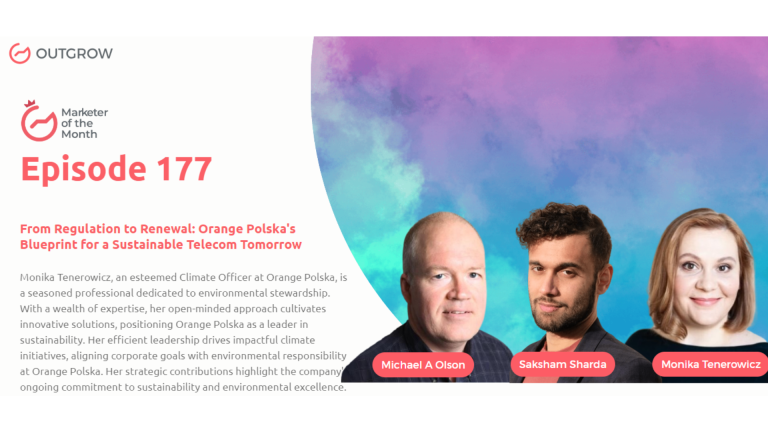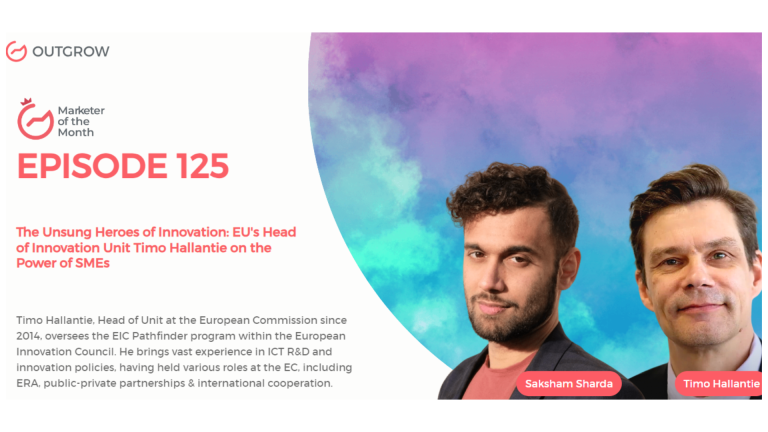Hey there! Welcome to the Marketer Of The Month blog!
We recently interviewed Oz Alon for our monthly podcast – ‘Marketer of the Month’! We had some amazing insightful conversations with Oz and here’s what we discussed about-
1. Insights into the organic evolution of HoneyBook and the realization of the need for a platform for service-based businesses.
2. Discussion on how the recent Series E funding enables strategic investments while maintaining a lean approach.
3. Introduction of the concept of client flow as a parallel to an online store for service-based businesses.
4. HoneyBook’s strategy stands out by offering a comprehensive solution, managing clients, cash, and calendars in one place.
5. Emphasizing the role of brand strength, rooted in core values and employee dedication.
6. Vision beyond HoneyBook involves promoting bilingualism among Israeli children to increase global opportunities.
About our host:
Dr. Saksham Sharda is the Chief Information Officer at Outgrow.co. He specializes in data collection, analysis, filtering, and transfer by means of widgets and applets. Interactive, cultural, and trending widgets designed by him have been featured on TrendHunter, Alibaba, ProductHunt, New York Marketing Association, FactoryBerlin, Digimarcon Silicon Valley, and at The European Affiliate Summit.
About our guest:
Oz Alon, the Co-founder and CEO of Honeybook, leads a team of visionary innovators and creative problem solvers. With a fervent mission to empower businesses to own their independence with passion and purpose, Oz is instrumental in building tools, resources, and a supportive community for independent ventures. Under his leadership, Honeybook pioneers a movement to ensure that independent businesses thrive by providing the necessary support and fostering an environment where entrepreneurs can succeed in doing what they love.
EPISODE 178: Managing Clients, Cash, and Calendars in 2024: Oz Alon’s One-Stop Solution
Table of Contents
The Intro!
Saksham Sharda: Hi, everyone. Welcome to another episode of Outgrow’s Marketer of the Month. I’m your host, Dr. Saksham Sharda, and I’m the creative director at Outgrow. co. And for this month we are going to interview Oz Alon, who is the Co-founder and CEO of Honeybook.
Oz Alon: Great to be here. Thank you.
Don’t have time to read? No problem, just watch the Podcast!
Or you can just listen to it on Spotify!
The Rapid Fire Round!

Saksham Sharda: So, as we are going to start with a rapid-fire round, just to break the ice, you get three passes. In case you don’t want to answer the question, you can just say pass. But try to keep your answers to one word or one sentence only.
Oz Alon: Yeah, I’ll talk about it, I’ll do my best.
Saksham Sharda: Well, the first one is, at what age do you want to retire?
Oz Alon: Sorry. Never.
Saksham Sharda: How long does it take you to get ready in the mornings?
Oz Alon: Too long.
Saksham Sharda: Favorite color?
Oz Alon: Right now pink.
Saksham Sharda: What time of day are you most inspired?
Oz Alon: Very early in the morning and very late at night.
Saksham Sharda: How many hours of sleep can you survive on?
Oz Alon: I need to sleep at least six hours.
Saksham Sharda: The city in which the best kiss of your life happened?
Oz Alon: The city of Tel Aviv.
Saksham Sharda: Pick one. Mark Zuckerberg or Elon Musk?
Oz Alon: Well, Elon is crazy, but look what? Like, come on. Like the impact on the world. He’s done.
Saksham Sharda: How do you relax?
Oz Alon: Take a deep breath.
Saksham Sharda: How many cups of coffee do you drink per day?
Oz Alon: At least five.
Saksham Sharda: A habit of yours that you dislike?
Oz Alon: No, actually not being patient.
Saksham Sharda: The most valuable skill you’ve learned in life.
Oz Alon: To love people fair.
Saksham Sharda: The next one is your favorite Netflix show.
Oz Alon: Oh, I don’t, well, the last dance was on Netflix.
Saksham Sharda: I’m not sure, but perhaps it was. Yes. The next one is the last song you’ve been listening to that had a good impression on you.
Oz Alon: Always imagined the first and last.
The Big Questions!

Saksham Sharda: Okay. Alright, well that’s the end of the rapid-fire round. Now we can score quite well. And now we can move on to the longer questions which you can answer with as much ease and time as you like. The first one is, could you share the journey of HoneyBook from its founding in 2013 to securing a significant series e-funding round valued at $2.4 billion?
Oz Alon: Yeah, so it’s interesting, you know we tend to believe that companies have this co-founding moment and that we can go back to kind of like, you know, this is what happened and why we started, what we started. And, from my experience, it didn’t work that way. There were so many co-founding moments that only in hindsight, I can go back in time and say, you know, that happened in 2013, or maybe it was something we’ve done in 2011, or maybe when we got married in 2 0 0 9, we already stopped thinking about it. And the truth that all of it is true, it’s all the above, right? That was the beginning. Back then, Nama, who’s my wife and co-founder who we are, I’ve been dating since we were 16 and have known her since we were 13. But back then, back in 2013, both of us were small business owners. Now, I own this design studio and design websites. And I owned a bar. And we were just amazed that, you know, while as service-based businesses that we were, we cared about the service, the level of service and we wanna make it a great experience for our clients to work with us, right? But we were surprised that as consumers from other businesses, it wasn’t always the case. For example, many businesses asked us to pay them with checks or cash, and, you know, we did it. We prefer to pay with a credit card. I think that was kind of the realization that there’s no platform for service-based businesses to sell their services, to communicate in a modern way with their clients, and to accept online payments. And that was kind of that understanding together with a lot of work with potential customers that led us to do what we do today. The other thing that was interesting back then in 2013 was that while we thought about it, when we were in Tel Aviv one of our very early investors offered us $25,000 as a condition to move to Palo Alto. And, you know, being in Tel Aviv I remember calling my wife and our co-founder drawer and telling them that, you know, we just got this offer, $25,000. And they asked me so what, you know, what’s the catch, right? And I said, well, the catch is that the guy said we need to move to Alto. And you know, both of them, my wife and or my co our co-founder were starting, they started searching Alto, on Google trying to figure out where that is? I was referring to Palo Alto, which I didn’t know until that day. And, a week later we were already in Palo Alto. Now, all this is important, I think for two reasons. One is that when we got to Palo Alto, we sat and met with other entrepreneurs and investors. And what’s interesting about that Silicon Valley mindset is that anyone will meet with you. It doesn’t matter who they are, they’re curious about what you’re doing. And two you meet, you meet with people that build huge companies, and they believe that you’re gonna build one as well. You know, while you don’t. They do. We have a very interesting phenomenon. So that’s the first thing that happened to us in Palo Alto. And, then the second thing that I like to share about this story about Alto Alto is the fact that, you know, it sounds funny to say out to Pato today, but I probably sail out to Pato 20 times a day about different things, and I don’t even know it. Right? You know, kind of operating a company and a startup you need to learn like, like a new skill, a new thing like the company grows and it requires different things from you. So you need to kind of get used to the fact that you just, you know nothing, right? And you just need to learn as fast as you can. So these two things you know, I like to take these are the takeaways from that Alto story and moving to Palo Alto. When we got to Palo Alto, one of the people we met was Bobby, who then invested in our first round, invested a million dollars in the first round, and invested many times since. But what was interesting again, was that Bobby was the founder of the Ariba network, so he built a multi-billion dollar company, went public, and then ended up being acquired by SAP. But from his eyes kind of looking at us and seeing how he’s imagining a company as big as Ariba you know, really got us to start believing in, wow, this could be, this could be a big thing, right? And then we start meeting customers, and I can’t stress enough how important it’s for our company to just go to market as soon as possible and talk to people. You know, one interesting thing that happened to us back then, I’m going too long maybe, so just feel free to stop me. I’m still in 2013 and there’s another 10 years to go. So, that was back in 2013 over the years, we were able to attract customers and, you know, the business model at HoneyBook as, first of all, what is HoneyBook? We make it easy to run a service-based business and service-based businesses of the likes of business coaches, photographers, interior designers, and web designers. They use HoneyBook to communicate with their clients and accept online payments. So the business model is that, like a transaction fee on the online payments and a subscription fee on using our software. So back in 2014, we transacted in the entire year, a million dollars of you know, a members business. What was interesting is to see how over the years the business grew to a point that today, you know, we, we transacted that amount in the, like, probably in the past two hours. So when you think about a company, how this journey is like the first year you do, you know the amount that 10 years later you do in two hours, you’re making two hours. The other thing I would say is over the years we saw more and more kinds of different verticals or different professions join us. We grew our team in San Francisco. We grew our team in Tel Aviv. My wife and I lived in San Francisco for eight and a half years until we moved back to Tel Aviv to operate from here. We still have a team on both sides, 50% of the companies they sent here. And then another few factors over the years, we were lucky to attract great investors. And as we were, we got the business, you know, we grew over a hundred million dollars of revenue annually. We serve more than a hundred thousand of these service-based businesses we’re able, at the same time, to raise five more than $500 million to support this growth and the future of that growth.
Saksham Sharda: And so how has this series E funding round impacted the company’s plans and strategies?
Oz Alon: Well, I’ll say this, and I think series Z ensured that, that we can keep building and creating value is a lot of confidence for our community. The businesses that use HoneyBook rely on us to manage all of their clients and more and more are assigned to rely on us and manage all of their cash. And we take that very seriously. So with the latest funding in the series E, it helped us invest in these areas. At the same time, I will say, you know, HoneyBook is not the kind of company that kind of raised money and tripled the team. We’re a relatively small team. When you think about our revenues, we are a team of 230 employees. So, you know, I think we wanted to, even after we raised a significant amount we wanna keep on operating the company with discipline and staying as lean as we can. Another reason this is important to us is our target audience. We serve small businesses, you know, micro-businesses even many times. And, we need to stay as lean and small as we can stay as close as we can to them to be able to meet with them, listen to them and, you know, kind of not get too, too far from that mindset that they have running their businesses.
Saksham Sharda: So how do you envision this concept of client flow and its significance for these independent small businesses? What specific challenges does HoneyBook help these businesses address by optimizing their client flow?
Oz Alon: So the concept of client flow is something that we had to come up with over the years because it was very hard to explain that combination. Is it a CRM? Is it a payment platform? And what we realized over the years is that service-based businesses don’t use an online store to sell their services, right? They don’t sell goods, they sell services. So they, that, that selling process, that commerce happens differently. And it happens through communication, through sending a proposal, an agreement, an invoice, and accepting a payment. So we had to give that a name, and we called it a client flow. So a client flow is a parallel of an online store for an e-commerce business, right? And the pain that it solves is that these businesses, especially these personalized service-based businesses, really rely on the ability to, on the one hand, they wanna close a deal, right? They have a new potential client, and they wanna close that deal, but on the other hand, they wanna make sure they set the right expectations. They want to make sure that even if they vet that client, they don’t want to work with anyone, right? They wanna make sure it’s the right client for that. So in the client flow, there’s this kind of balance between wanting to close the deal but wanting to spend the time setting the expectation and starting that relationship in the best possible way. And that tension between these two is what we have worked on like every day for probably the past 10 years.
Saksham Sharda: So you’ve also mentioned in your earlier speeches that you mentioned doing things that didn’t scale, such as manually handling customer support and wiring payments to members individually. How did these hands-on efforts help you better understand your members and their businesses, and how do they contribute to your ability to anticipate and address their needs?
Oz Alon: I love that question. First of all you know, you are right. I transacted 1,743 transactions. And you know what, when I look back at that, I think it’s important for any company to figure out what are the things you know you can automate, right? And one of the things you need to prove, we know that we need to prove that we can solve that pain, that we can create real value. And we didn’t spend the time automating the backend until we can prove that, right? So we said, okay, I can just go into the bank account and I get our company’s bank account and transfer the money. Every time someone accepts an online payment, I will transfer the money to that, to our customer, right? And it got to a point that I just couldn’t, you know, I was afraid to go to sleep because I wanna be, make sure I transact the money on time. I don’t miss the cutoff. Because if I do, it will go over the weekend. They won’t get their money on time. So it was a big pain. You know, I’ll get the notifications on my phone in the middle of a meeting, I’ll see notifications. It’s getting close to the cutoff. I will run out and try to transfer the money as fast as I can. But in hindsight, what that, what that did to me is like, as, and, now I benefit as a CEO, is I got to see and feel every single transaction I knew who is the customer, who is the member that received that transaction, who is the member, didn’t receive a transaction for quite a while. There was a name I hadn’t seen for quite a while. And I would, I would say to the team, you know, did anyone notice what happened with her? You know, I didn’t see that name. And the team would check and we would call her. And many times we would find that, you know, that member was frustrated about something. And the fact that I could feel and see it helped us mitigate that or, or, or understand we’re doing something wrong that we’re not serving our members in the best possible way. So it helped me as a CEO be as connected as possible to the core of our business. And that’s something I, you know, would share and advise any entrepreneur out there, like trying to tie yourself into, like, the core of the business. And I’m not saying you need to do everything manually or build things that don’t scale, but you’ll benefit from that and the company will benefit from that.
Saksham Sharda: So as this need for a strong client flow and innovative solutions continues to grow, how does HoneyBook plan to deliver differentiated value and stay ahead and ahead in the market?
Oz Alon: So we believe that the combination of you managing your clients and your cash in one place creates magic because it’s, it’s, it’s money with context, right? We can share with you, we can give you a view of everything that is going on in your business and the most accurate view. And at the same time, you know, help you make decisions with confidence. You know, there’s kind of four Cs as a service-based business that you have. You have your clients, your cash, and your calendar, that’s time and your craft. We wanna be differentiated by the fact that the first three Cs will be managed on HoneyBook. The fourth one is yours. The craft is yours. That’s your superpower. I hope it answers.
Saksham Sharda: What role do you think the brand plays here? How do you envision the relationship between brand strength and customer trust going forward?
Oz Alon: Brand, you know, when we think about a brand at HoneyBook, we always start with our, with our core values, honey book’s, core values, the company’s core values. Because, we do believe that real brands start there with your employees, right? Without our team members at HoneyBook, how they experience, like who they are, how they experience, you know, building HoneyBook, and, what are these values that guide us? And so it starts there. Then it’s about the fact that we are obsessed with our members. And not only we’re obsessed about our members, but we are all obsessed about love. It sounds, I dunno, corny maybe, but we are all people who care about the fact that our members love us. And every time that’s not the case, if there’s like a bad review, it, you know, it hurts. We are bothered by, bothered by it, and it doesn’t paralyze us. It really kind of motivates us to fix it and do whatever needs to be done. But at the same time, just to see how, every single employee in this company takes it to heart when they see a bad review or vice versa, or the opposite when they see a good review. You know, it just kind of just fills up with us with energy. I believe that is like, what is building the brand of this company. That’s the brand. That’s what every one of our members experiences when they work with HoneyBook. And if they don’t experience that we’re doing something wrong. And, if that’s the case, we’re gonna work hard to fix that.
Saksham Sharda: So leaving all this aside, the last question for you is of a personal kind. What would you be doing in your life, if not this right now?
Oz Alon: You know, in Israel, the first language is Hebrew. I would love to, so one of the things I’m keen about is that I think like every kid in Israel should be bilingual and fluent in English. Because I think it’s the best way to increase the opportunity that every single person will have. And then outside of Israel, if we, if I can do that on a global scale, you know, in the world, I would love to spend every single minute that I have working on that. More people have a common language.
Let’s Conclude!
Saksham Sharda: Thanks, everyone for joining us for this month’s episode of Outgrow’s Marketer of the Month. That was Oz Alon, who is the Co-founder and CEO of Honeybook.
Oz Alon: Great to be here. Thank you.
Saksham Sharda: Check out the website for more details and we’ll see you once again next month with another marketer of the month.





